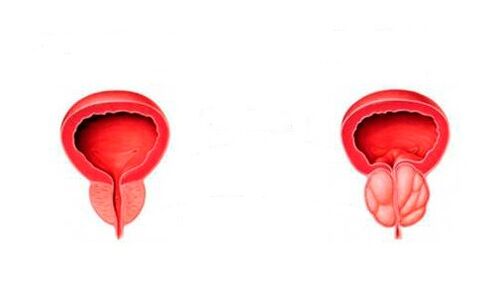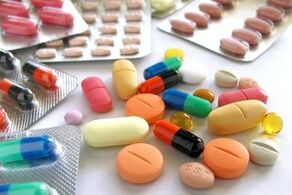Today, in terms of the types of drugs provided, the drugs for treating prostatitis are far from the last. This is not in vain: prostate disease is the most common disease in the pathology of the male reproductive system.

Prostatitis is an inflammatory process of the prostate.
In most cases, inflammation of this organ will show up:
- Discomfort in the genital organs during urination or outside of urination;
- Pain during ejaculation (ejaculation);
- Discomfort in the pelvic area and external genitalia.
All of these can lead to decreased activity and overall well-being, emotional instability, and psychological disorders. If you have these symptoms, you should contact a specialist immediately.
A qualified urologist will perform the necessary diagnostic methods and help cope with the disease.
Although it should be noted that the healing process may take some time, it is easier to deal with minor dysfunctions of this organ than to start a developmental process with irreversible fatal consequences, including prostate cancer.
General rules of treatment

As mentioned above, prostatitis is an inflammatory process, and like any inflammation, it is most often caused by bacteria, so it is not surprising that the drugs for prostatitis are mainly antibacterial agents (antibiotics).
The next step in the fight against disease is non-steroidal anti-inflammatory drugs. They reduce the edema in the prostate area by affecting the microcirculation of the organ, thus producing a positive effect. The purpose of this series of treatments is to reduce venous congestion in the small pelvis.
Another important point in the treatment of patients with reproductive system diseases is to relieve pain syndromes. In most cases (especially chronic or complex diseases), pain is the main complaint, so doctors should help patients cope with extreme discomfort in the external genital area as soon as possible.
The final stage is to prevent treatment complications and recurrence in the future.

Here, you can prescribe immunity-improving drugs, vitamin therapies, and overall health recommendations, which may include:
- Low-fat diet;
- Moderate physical activity;
- Stay in the fresh air;
- Observe the basic rules of personal hygiene;
- Reject bad habits (smoking, alcoholism);
- A physical examination is arranged every six months.
By following these simple rules, you can not only avoid complications, but also prolong your sexual activity.
The first step: pest control
Experts conditionally divide the antibacterial drugs for prostatitis into three categories: fluoroquinolones, tetracyclines and macrolides, and less frequently-cephalosporins.
Fluoroquinolones are considered to be the most effective drugs for the treatment of diseases of this organ because they have the following characteristics:
- Affect most types of microorganisms that cause genitourinary system diseases;
- It accumulates in glandular tissue and has the greatest impact on bacteria;
- Almost no immunodeficiency will be caused after a course of treatment;
- Will not cause drug resistance (microbial resistance to the action of such antibacterial drugs).
Other prominent representatives of the group of antibacterial agents used for inflammation of this organ are tetracyclines and macrolides.
Long before the advent of their improved partners, fluoroquinolones, these drugs helped cope with bacterial prostate dysfunction. However, with the passage of time, microorganisms have become increasingly resistant to these two types of drugs. In addition, these drug groups have a fairly long list of side effects and contraindications.
It should be noted that any antibacterial drugs may have sperm toxicity, and patients should be informed in advance. It is not advisable to use antibiotics at least four months before the expected conception (the complete cycle of spermatogenesis).
Step 2: Reduce swelling
Prostate disease drugs that have a positive effect on microcirculation have been well proven in modern prostate disease treatment programs. They help to adequately supply medicinal compounds to the glands through the blood, improve the outflow of secretions from the ducts of the organ, and increase the metabolic processes in the cells, which usually help the body cope with inflammation.
In this group of drugs, non-steroidal anti-inflammatory drugs (NSAIDs) are different. In most cases, two forms of drugs in this series are used:
- Rectal suppositories-due to the local action of the drug, the effect is relatively fast, thereby reducing the frequency and duration of admission;
- Drip inside. The duration of the course is twice that of rectal suppositories. Take 15 drops 4 times a day before meals.
To help patients
Drugs for the treatment of prostatitis, its main direction of action is immune correction and pain relief, and there is no specificity. But they can still reduce the fate of patients and reduce the risk of re-inflammation.
To relieve pain, your doctor may prescribe pain medications by mouth (oral) or rectal (suppositories and microcapsules). At the same time, the effect of taking pills is relatively short-term, but it is more convenient to use.
Specific therapy
Recently, more and more effective drugs for treating prostatitis have a narrow range of action in the body, and more and more prescriptions are made. All of these combine and act in glandular tissues, and at the same time they have a beneficial effect on organ cells, increasing their metabolism and the process of restoring function.
The combination medication is easy to use, but don’t forget the generally accepted treatment for prostate inflammation. It is best to consult an expert about taking these drugs.
Hormone treatment of prostatitis
Increasingly, male sex hormone drugs have been used as a general treatment for prostate inflammation. But it is important to remember that they should be treated very carefully, and before making an appointment, make sure that they are necessary for the patient.
For a long time, patients with this disease have noticed a decline in the quality of their sexual life. Among other things, these patients experience depression and apathy in the context of sexual inferiority. Hormone therapy will help cope with sexual dysfunction and improve a person's general condition.
No matter what medicine the urologist recommends for you to recover, don't forget that the key to the treatment of any disease is to strictly follow the doctor's instructions and prescriptions, diagnose and take care of your health early.
Regardless of the possibility of recurrence, don't neglect prevention. Disease prevention is better than cure.































